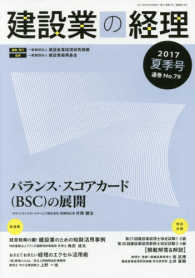- ホーム
- > 洋書
- > ドイツ書
- > Humanities, Arts & Music
- > Philosophy
- > general surveys & lexicons
Description
(Text)
This study provides a wide-ranging critique of contemporary anti-humanist postcolonial theory. By charting a genealogy of the complicity of humanism and oppression in the New World, this analysis highlights the process of consolidation of a racialised, autonomous and rational modern subject as well as the existence of a fractured modernity. Situating contemporary Derridean critiques of humanism within the Hegelian tradition, this work demonstrates that post-modern anti-essentialism does not succeed in escaping totalisation. Furthermore, it contextualises the fractured modernity of the Western humanist tradition in relation to the works of key twentieth-century thinkers such as Frantz Fanon, Hannah Arendt and Emmanuel Levinas, arguing that these authors problematise the common reduction of humanism to a totalising outlook, due to their revelation of the gaps and fissures prevalent in the modern. Combining insights drawn from Fanon's emphasis on lived experience, Arendt's enlarged mentality and Levinas's non-ontological transcendence, this study aims to deconstruct the complicity between humanism and colonialism.
(Table of content)
Contents: The Post-Colonial Dilemma - Humanism and Anti-Humanism: Kant, Hegel and Marx - Alterity and 'In-Between-ness' - Slavery and the New World: What is Human - Historicism and the Reinscription of Difference - Negotiating Dialectics: Fanon, Arendt and Levinas - Fanon: Humanism as Lived Experience - Race, Nation and Violence - Arendt: Humanism as Space of Freedom - Political Equality and Social Discrimination - Levinas: Humanism as Excluded Middle - Community and Recognition.
(Author portrait)
The Author: Claudia Alvares obtained her Ph.D. from Goldsmith's College, University of London, in June 2001. She is currently Associate Professor in Culture and Communication at the Communication and Information Department of Lusofona University, Lisbon, Portugal.








